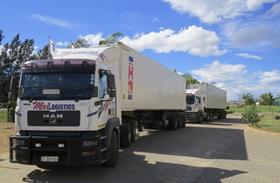
Forget about Donald Trump, Brexit or land seizures without compensation – the South African fruit export industry will face a far more serious challenge if the dispute around the movement of high cube containers on the country’s roads is not resolved soon.
The transport authorities have made 1 January 2019 the final deadline for the expiry of the Moratorium on the implementation of a ban, aplied to trailers with loads over 4.6 metres in height.
If implemented, the new regulations will seriously disrupt the fruit export industry during the next season, and thereafter.
The problem is that at this late stage there is simply not enough of the lower trailers available in South Africa to keep exports going without exceeding the regulations applied to the country’s roads.
The dispute has been simmering for seven years, with the freight industry claiming that it does not have the resources to convert to the fleet of trailers which will allow the movement of High Cube containers under the new law. The government claims that the freight industry had seven years to comply and that the implementation will no longer be delayed.
The matter took an unexpected turn this week when the Port Authority, Transnet Port Terminals (TPT) revealed in an article in the country’s leading freight publication, Freight and Trading Weekly (FTW), that from 1 November it will no longer offload empty incoming empty containers from ships unless the shippers and haulers are able to prove that they have onward transportation for these High Cube containers.
This will be at the start of the South African stonefruit and table grape seasons and could result in severe shortages in the industry.
FTW claims that the country only has a handful of the lower trailers available to transport the containers legally if the new legislation is implemented. It is understood that haulers will be able to give the necessary assurances to move these containers out of the port, but only until the end of December 2018.
Haulers say that while they understand the TPT announcement, they will simply not be able to move the incoming containers from 1 January 2019.
“We can simply not accept incoming boxes after I January,” said a spokesperson of the haulers association. “If the containers are offloaded, the ports will become congested very quickly.”
The fruit industry has presented a memorandum to the government on the impact that the dispute will have on the future of the fruit export industry.



